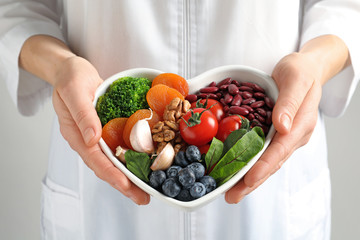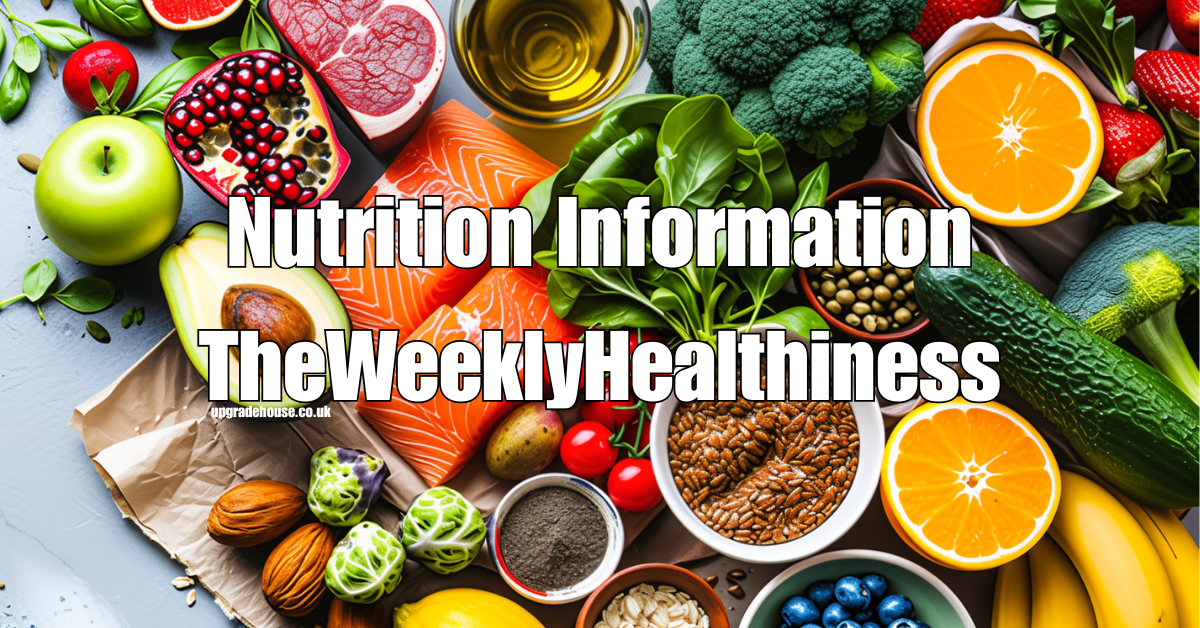Nutrition information theweeklyhealthiness is the base of good health, and understanding it in a simple way helps people make better choices every day. When we talk about nutrition information theweeklyhealthiness, we are looking at easy steps to eat well during the week without confusion. Many people think nutrition is hard, but it can be simple if we know what foods to eat more often and what to reduce. This guide makes nutrition clear, easy, and practical so you can follow it daily. By learning about balanced meals, portion sizes, and smart swaps, you will feel healthier and have more energy for your daily activities.
Why Nutrition Information TheWeeklyHealthiness Matters
Good nutrition is not just about weight control, it is about full body health. By using nutrition information theweeklyhealthiness, you can prevent many health problems like diabetes, heart issues, and high blood pressure. Food affects how you feel, how you sleep, and how much energy you have. Eating balanced meals also helps with clear thinking and mood balance. It is important to make small changes weekly, because slow improvements are easier to follow. With the right nutrition information, you can plan your weekly meals, save money on food, and avoid unhealthy fast-food habits.
The Basics of Nutrition Information TheWeeklyHealthiness
Every person needs a mix of carbohydrates, proteins, fats, vitamins, and minerals. Carbohydrates give energy, proteins build muscles, and fats protect organs and help absorb vitamins. With nutrition information theweeklyhealthiness, you will learn how to balance these nutrients daily. Instead of avoiding whole food groups, it is better to understand portions and quality. For example, whole grains give longer-lasting energy compared to sugary snacks. Lean protein sources like fish or beans are healthier than fried meats. By knowing these basics, you can plan better weekly meals.
How to Read Nutrition Labels the Easy Way
Many people skip reading food labels because they look complex. However, nutrition information theweeklyhealthiness teaches you how to read them in simple steps. Look first at serving size because packages often contain more than one serving. Then check calories, which show how much energy you get. Next, see the fat, sugar, and salt levels, because these are the things you should limit. Finally, check vitamins, fiber, and protein, because these are nutrients to eat more often. By learning label reading, you can shop smarter.
Building a Balanced Weekly Meal Plan
Planning meals for a whole week may feel hard, but nutrition information theweeklyhealthiness shows that it is simple with a few rules. Always include vegetables and fruits in every meal, because they provide fiber and vitamins. Add whole grains like brown rice or oats to give steady energy. Include lean proteins such as chicken, eggs, or lentils. Try to limit fried foods, sugary snacks, and soft drinks. Preparing meals at home also saves money and reduces unhealthy choices. A weekly plan helps avoid last-minute junk food.

Fruits and Vegetables: The Core of Nutrition
One of the strongest tips from nutrition information theweeklyhealthiness is to eat at least five servings of fruits and vegetables each day. They are rich in vitamins, minerals, and antioxidants that protect the body from diseases. Fresh produce also adds natural color, flavor, and texture to meals. Eating different colors like green spinach, orange carrots, and red berries ensures a mix of nutrients. Frozen and dried fruits can also be good if used without added sugar. Vegetables should be part of both lunch and dinner for the best results.
Whole Grains for Long-Lasting Energy
Whole grains are better than refined grains because they keep more fiber and nutrients. According to nutrition information theweeklyhealthiness, foods like brown rice, oats, and whole wheat bread help you feel full longer and prevent blood sugar spikes. Fiber from whole grains also supports digestion and keeps cholesterol low. Switching from white bread to whole wheat bread is one small change that makes a big difference. Eating whole grains regularly during the week keeps your body fueled and reduces cravings for unhealthy snacks.
Proteins and Their Role in the Body
Proteins are the building blocks of the body. With nutrition information theweeklyhealthiness, you will learn that both animal and plant proteins are important. Animal proteins include chicken, fish, eggs, and dairy, while plant proteins include beans, lentils, and nuts. Eating a mix of these helps muscles, bones, and skin stay strong. Fish like salmon and tuna also provide healthy fats. It is better to grill or bake protein foods instead of frying them. Adding small portions of protein to each meal keeps you full and energized.
Healthy Fats vs. Unhealthy Fats
Not all fats are bad. Nutrition information theweeklyhealthiness explains that healthy fats, found in avocados, nuts, olive oil, and fish, are good for the heart and brain. However, unhealthy fats like trans fats in processed foods and too much saturated fat from fried items should be avoided. Replacing butter with olive oil or snacking on almonds instead of chips is a healthy swap. Eating healthy fats in moderation helps absorb vitamins like A, D, E, and K. Balance is the key to using fats wisely.
The Importance of Water
Many people forget that water is part of nutrition. Nutrition information theweeklyhealthiness stresses drinking enough water every day because it helps with digestion, circulation, and temperature control. Water also prevents dehydration, which can cause headaches and tiredness. A simple rule is to drink at least eight glasses daily, more if you are active. Replacing sugary sodas with water or herbal tea reduces calorie intake and improves hydration. Keeping a reusable water bottle nearby makes it easier to drink water regularly throughout the day.

Snacks That Support Health
Snacking can be healthy if you choose wisely. Nutrition information theweeklyhealthiness suggests snacks like fruit slices, nuts, yogurt, or whole-grain crackers. These snacks give energy without too much sugar or fat. Many people overeat unhealthy snacks because they skip meals or do not plan ahead. Keeping healthy snacks ready at home or work reduces the chance of eating chips or candy. Snacking smartly can keep your blood sugar stable and prevent overeating at mealtimes.
Reducing Sugar Intake Step by Step
Sugar is one of the biggest problems in modern diets. Nutrition information theweeklyhealthiness advises reducing sugary drinks, desserts, and processed snacks. Too much sugar causes weight gain, diabetes, and tooth problems. A good way to cut down is by drinking water instead of soda, using fruit instead of sweet desserts, and reading labels for hidden sugar. Over time, your taste buds adjust, and you will crave sugar less. Making small weekly changes creates lasting healthy habits.
Controlling Salt in Your Diet
Too much salt raises blood pressure and increases the risk of heart disease. With nutrition information theweeklyhealthiness, you learn to limit processed foods like chips, canned soups, and fast food, which often contain hidden salt. Cooking at home gives you control over how much salt you use. Using herbs, spices, lemon, or vinegar adds flavor without extra sodium. Choosing fresh ingredients and reducing salty snacks helps protect your heart and kidneys in the long run.
Portion Control Made Simple
Even healthy foods can cause weight gain if eaten in large amounts. Nutrition information theweeklyhealthiness teaches portion control. Use smaller plates, measure servings, and listen to your body’s hunger signals. Half of your plate should be fruits and vegetables, a quarter whole grains, and a quarter protein. Eating slowly helps you feel full without overeating. Planning portions in advance also prevents unnecessary snacking. Portion control allows you to enjoy all foods without guilt.
Planning for Eating Out
Eating outside is common, but with nutrition information theweeklyhealthiness, you can still make healthy choices. Look for grilled instead of fried foods, order water instead of soda, and add vegetables whenever possible. Sharing large portions or asking for smaller servings helps manage calories. Reading menus before going out also helps in making better decisions. Balance is important; it is okay to enjoy a favorite meal sometimes, but regular small healthy choices matter more.

Weekly Grocery Shopping Tips
Healthy eating starts with smart shopping. According to nutrition information theweeklyhealthiness, the best way is to make a list before going to the store. Stick to fresh produce, lean proteins, and whole grains. Avoid walking down snack aisles with chips, sodas, and sweets. Buying in bulk saves money, and choosing seasonal fruits and vegetables adds variety. Always check labels and compare brands for healthier options. A smart shopping plan makes healthy eating easier during the week.
The Role of Exercise and Nutrition Together
Food and exercise work best together. Nutrition information theweeklyhealthiness shows that eating well provides energy for workouts, while exercise helps your body use nutrients better. Regular physical activity also helps control weight, improves mood, and strengthens bones. A healthy lifestyle means combining balanced meals with activities like walking, swimming, or sports. You do not need to exercise heavily; even 30 minutes a day of movement supports your nutrition plan.
How to Stay Motivated
Changing eating habits takes time. Nutrition information theweeklyhealthiness recommends setting small goals and tracking progress. Celebrate little wins like eating more vegetables or drinking enough water. Surround yourself with supportive friends or family who encourage healthy choices. Do not feel bad about small slip-ups; instead, focus on getting back on track. Keeping a food journal or using apps helps you stay motivated. Building habits step by step ensures long-term success.
Common Myths About Nutrition
There are many myths about food. Nutrition information theweeklyhealthiness clears them up. One myth is that all carbs are bad, but whole grains are healthy. Another myth is that fat should be avoided completely, but healthy fats are good. Some people believe skipping meals helps weight loss, but it actually slows metabolism. By understanding the truth, you avoid mistakes and focus on balanced nutrition. Simple facts are more powerful than trendy diets.
Conclusion
At the end of the day, nutrition information theweeklyhealthiness is about balance, variety, and smart choices. Eating healthy does not mean giving up everything you enjoy. It means adding more good foods, controlling portions, and making better swaps. A healthy week includes colorful vegetables, whole grains, lean proteins, water, and smart snacks. Over time, these choices become natural habits that support long-term health. Good nutrition is a gift you give yourself every day.
FAQs
1. What does nutrition information theweeklyhealthiness mean?
It means simple weekly tips to eat healthy with balanced meals, portion control, and smart food swaps.
2. How can I follow nutrition information theweeklyhealthiness daily?
Plan meals, eat more vegetables, drink water, and reduce sugar and salt.
3. Can I still eat my favorite foods?
Yes, you can enjoy them in moderation while focusing on overall balance.
4. Do I need supplements with nutrition information theweeklyhealthiness?
Most nutrients come from real food, but supplements can help if recommended by a doctor.
5. Is nutrition information theweeklyhealthiness good for weight loss?
Yes, because it focuses on healthy habits that naturally control weight.
Read Also: Useful Hacks Whatutalkingboutfamily for Stress-Free Family Life




